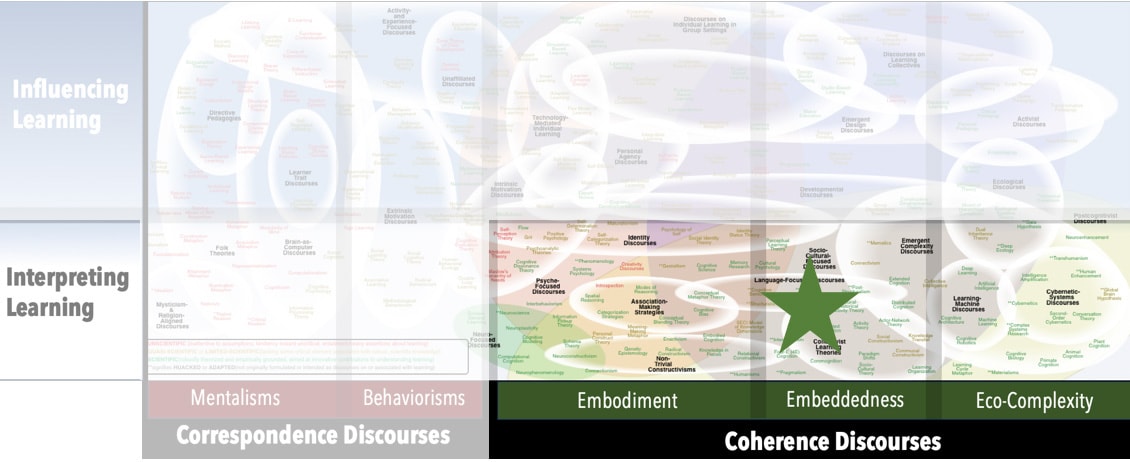Focus
The iterative dynamic of learningPrincipal Metaphors
- Knowledge is … ever-changing, iteratively generated scope of possibilities
- Knowing is … current possibilities
- Learning is … any dynamic, adaptive system
- Learning is … iterative elaboration
- Teaching is … N/A
Originated
1930sSynopsis
The metaphor of a Learning Cycle is an explicit alternative to the imagery implicit in linearized conceptions of learning. Rather than casting learning as an accumulative process, the metaphor of a Learning Cycle channels attention to the roles experience and reflection. That is, learning is imaged not as lines, steps, and progress, but as iterative loops, elaborations, and growth. This imagery is common across Coherence Discourses, and it is especially prominent among Developmental Discourses and those perspectives that foreground action and reflection. Associated discourses include:- Experiential Learning Spiral (Experiential Learning Cycle; Recursive Learning Cycle)
- Feedback Loop – an aspect of the self-regulating processes of a dynamic system, typically characterized as a recursive cycle by which a system triggers an action or change, which then “feeds back” information that helps to determine the system’s next action or change. Typically, a self-maintaining system uses multiple Feedback Loops to modulate itself. (See more in Cybernetics.) Associated constructs include:
- Circular Causality – a constrained type of Feedback Loop, in which a clearly discernible sequence of causes-and-effects leads back to the original trigger – thus sparking a new sequence, potentially in endless cycle
- Recursion (Recursive Elaboration) – a type of repetitive process in which each step transforms/elaborates the structure that was produced through the previous steps. (See, e.g., Second-Order Cybernetics.) Most Coherence Discourses assume that learning is a recursive (vs. accumulative) process.
- Bloom’s Model of School Learning (Benjamin Bloom, 1970s) – the proposal that learning outcomes (i.e., levels and types of achievement, rates of learning, and affective outcomes) are determined from four elements: (1) cognitive predispositions, (2) affective predispositions, (3) learning tasks, and (4) the quality of teaching. The Model is concerned mostly with the series of learning tasks, emphasizing a cyclical or iterative approach whereby the output of a learning task become the input of the subsequent tasks.
- Experience-Language-Pictorial-Symbolic-Application (ELPSA) (Tom Lowrie, Sitti Maesuri Patahuddin, 2010s) – a cyclical model of mathematics instruction that is clearly based on Bruner’s Three Modes of Representation (under Stages of Understanding Models), but that evidently ignores bruner’s cautions against making rigid distinctions among types of representation and interpreting the triad as some sort of instructional sequence
- Decision Cycle – an umbrella term that collects a range of step-based processes to reach and implement decisions. Examples include:
- OODA Loop (John Boyd, 1970s) – Observe–Orient–Decide–Act
- Transtheoretical Decision Model (J.O. Prochaska, 1990s) – Precontemplation–Contemplation–Preparation–Action–Maintenance
Commentary
The notion of a Learning Cycle does not offer not much to critique – as might be interpreted from its ubiquity across Coherence Discourses.Authors and/or Prominent Influences
Diffuse. As noted, the notion is invoked in virtually all Coherence Discourses.Status as a Theory of Learning
A Learning Cycle is a principle of learning that is invoked by almost all Coherence Discourses. It is a metaphor/image used to describe a specific learning dynamic, but it falls short of a being a full-blown theory of learning.Status as a Theory of Teaching
A Learning Cycle is not a theory of teaching.Status as a Scientific Theory
There is a substantial body of evidence supporting the utility of the metaphor of a Learning Cycle. Perhaps the strongest and most explicit support has been provided in empirical research associated with Complex Systems Research.Subdiscourses:
- Bloom’s Model of School Learning
- Circular Causality
- Decision Cycle
- Double Diamond Model of Design Thinking
- Experience-Language-Pictorial-Symbolic-Application (ELPSA)
- Experiential Learning Spiral (Experiential Learning Cycle; Recursive Learning Cycle)
- Feedback Loop
- OODA Loop
- Plan–Do–Check–Act Cycle (Deming Cycle; PDCA Model)
- Recursion (Recursive Elaboration)
- Scientific Method
- Transtheoretical Decision Model
Map Location

Please cite this article as:
Davis, B., & Francis, K. (2024). “Learning Cycle Metaphor” in Discourses on Learning in Education. https://learningdiscourses.com.
⇦ Back to Map
⇦ Back to List
